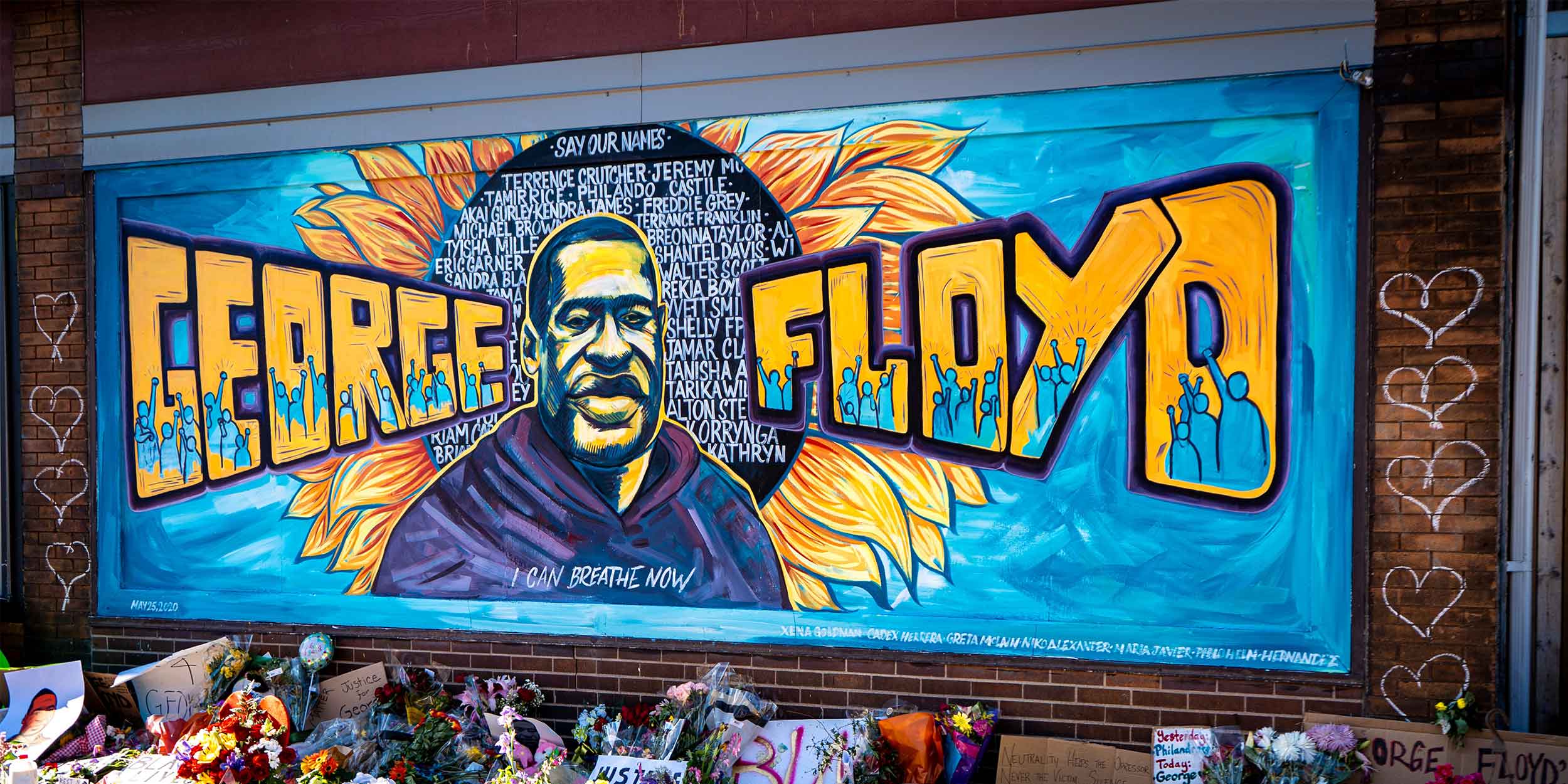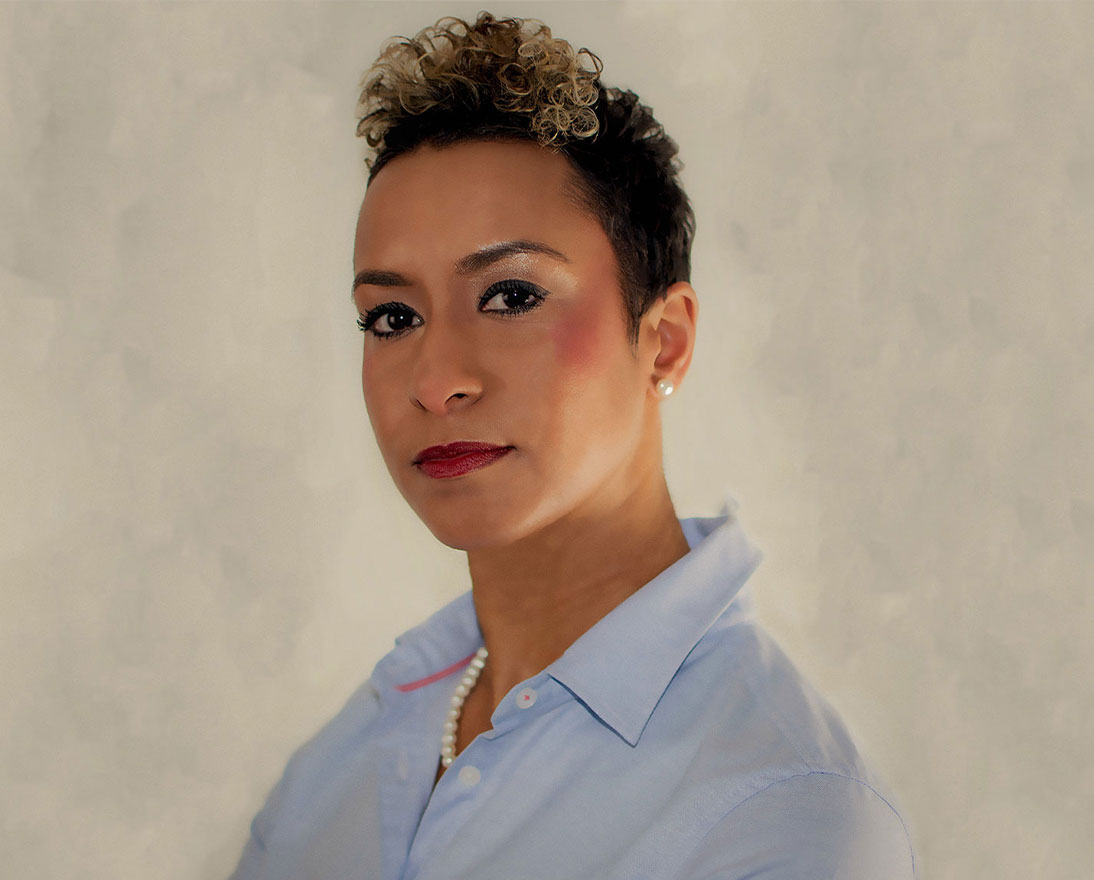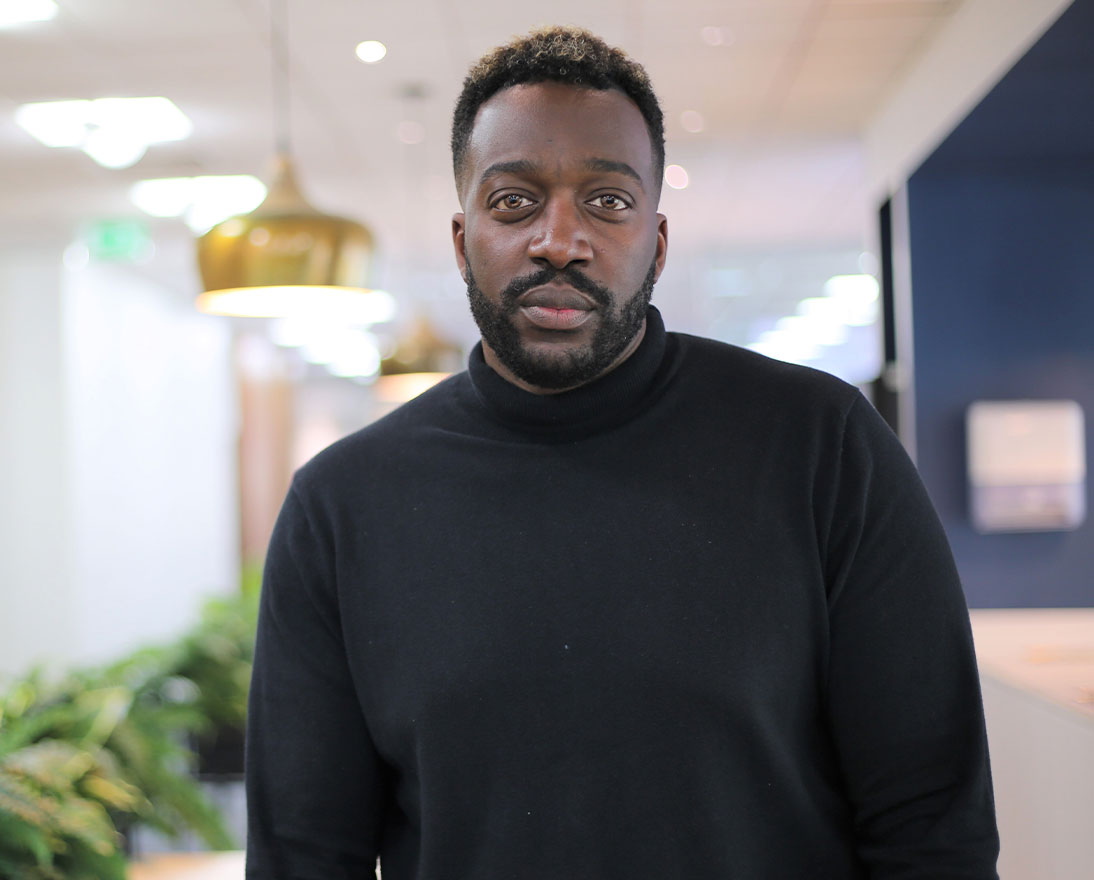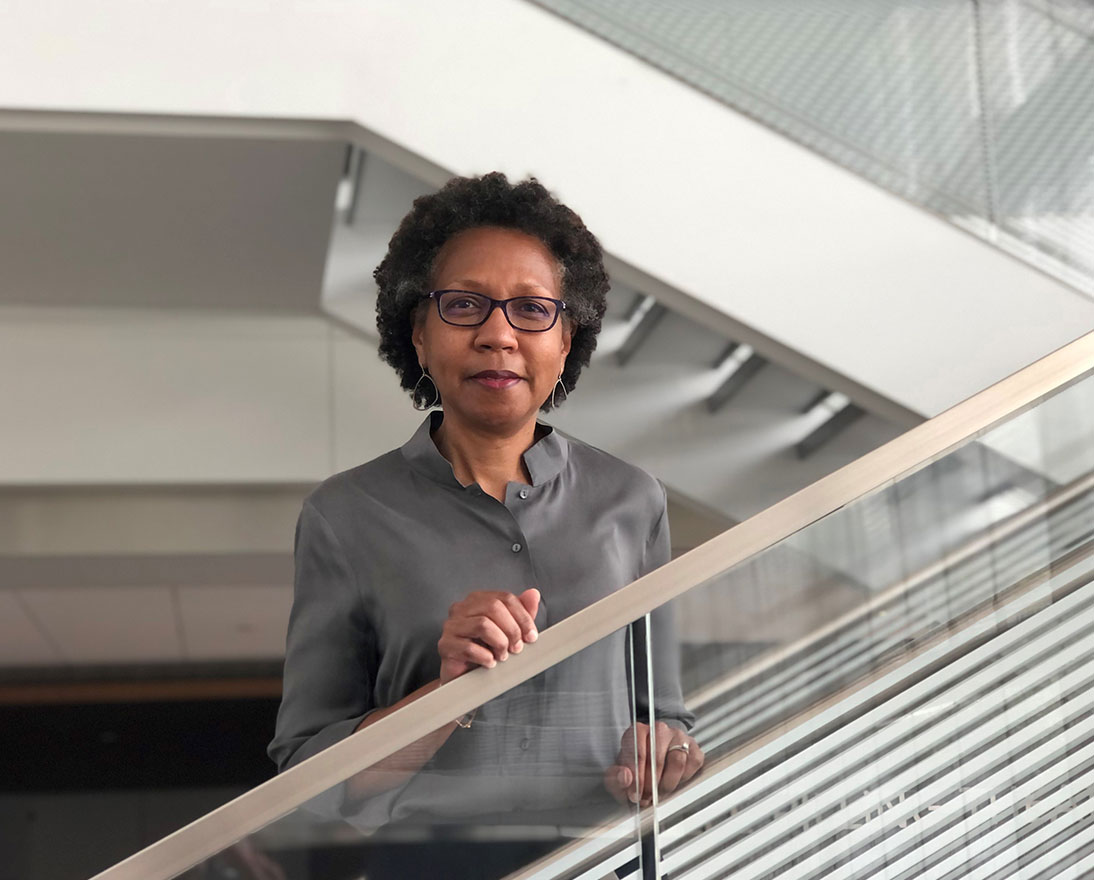Black Voices: One man’s year of reckoning after George Floyd
PeopleArticleJune 11, 202112 min read
‘Every time I saw the video, I saw myself’: Jonathan Jackson reflects on his own wrongful arrest and need for overdue healing.
Not until a few days after Jonathan Jackson saw video of George Floyd dying under the knee of a police officer, did he relive his own experience of excessive force in California. For over a decade, Jonathan had suppressed the memory of his wrongful arrest and instead built a career as an award-winning market-facing underwriter at Zurich North America.
As a young Black man in America, he had plenty of practice willing himself to look past racism, while bracing himself daily to encounter it.
“How often do I have to think about racism? The moment I step outside my door, I am always hyper aware of how I am carrying myself, how I am speaking, how I am walking, how I am driving,” Jonathan says. “All of this because I have had experiences in the past where, in a moment where I’m caught being too comfortable, it makes certain groups of people not comfortable. And that is just something I have tried to avoid my entire life — making white people, in general, feel uncomfortable with my presence.”
Video of Floyd’s death has caused different kinds of discomfort. Watching the footage made it difficult for people around the globe to look past the presence of racism in modern life. In the months since, many people of all colors have talked more openly about racism and what they can do to contribute to an anti-racist future. Jonathan agreed to share the impact Floyd’s death had on him, and what actions he thinks can drive progress, as part of Zurich’s recognition of Juneteenth, the June 19 anniversary of the de facto end of slavery in the U.S.
When Jonathan first saw the full video of Floyd’s arrest and death, his heart sank.
“It just felt so cold and intentional and the officer just seemed so unbothered and having zero fear of being held accountable. Watching a man suffer like that in front of everyone and beg and plead for his life when he’s clearly not putting up much resistance — it was brutal.”
It also felt somewhat familiar, which Jonathan realized after he was invited to participate in a June 2020 panel discussion presented by the Zurich African Ancestry Alliance (ZAAA), an employee resource group for which he serves as co-chair of the Chicago chapter. The topic was “Supporting Racial Equality & Belonging: How to Make Actionable Progress.” As Jonathan prepared for it, he saw parallels between his earlier wrongful arrest and Floyd’s dying day.
“Initially I didn’t have any thoughts of discussing that piece of my life,” Jonathan says.
One night in 2009
But midway through the panel discussion, in a calm and steady voice, Jonathan described a night in 2009 in California, where he was visiting his best friend, also Black. They, along with four white men his friend had gone to college with, were leaving a bar around 11 p.m., when a police officer stopped Jonathan. They told him he fit the description of someone who had caused a ruckus in the bar and pulled him toward a police car.
Jonathan’s best friend, raising his hands reflexively, said there must be a mistake. An officer tased him, then shoved Jonathan onto the hood of their car and slammed his head against it repeatedly.
“I stood up in disarray; I may have been concussed. They tell me to stop resisting, and they slam me to the ground. My body at this point is between a curb and a tire of the police unit. They have their knee on my back and their hands are pushing my head onto the concrete. And this is something that I thought of when I saw the video of George Floyd. I could have very easily become that.”
Officers brought Jonathan to his feet and pushed him into the police car. They also arrested his best friend.
“I’m pleading with them that the cuffs are entirely too tight, to the point where it was unbearable. They put me in the back seat of the car; I wasn’t strapped in or anything, and they’re driving away pretty aggressively. I don’t even know why I’m being arrested.”
He and his best friend were booked into jail. Jonathan had a black eye, a broken thumb and bruised wrists.
“I’m defenseless at this point, I’m from out of state, I’m fresh out of college, I don’t have much money. This is the age of not memorizing all phone numbers, so I didn’t have many California numbers I could call. I ask the guy taking my fingerprints, ‘What am I being charged with?’ My charges were resisting arrest and battery on an officer – which is a felony. I recommend anyone who hasn’t seen the documentary ‘13th’ on’ Netflix to watch it because this is exactly how this process begins.”
Or, where a life of promise can end.
“I was charged with three crimes that I was not guilty of. I got put in jail for four days. I could have very easily been a convicted felon and trying to navigate the United States and be successful with that on your record is next to impossible. And I did absolutely nothing. From that point on, I felt that I am extremely vulnerable and my life is in the hands of someone at any moment who is having a bad day or just doesn’t like my skin color.”
A determined advocate
In one stroke of mercy, he was appointed a public defender who was an African American woman and advocated for him as if he were a son.
“The charges didn’t make sense to her. She fought to have them dropped. I still ended up carrying one for a little while and ended up not getting a job because of it. I still didn’t have money for an attorney, so I read every possible document that I could find on the state of California’s website. I paid the fee and sent in all the documentation and followed up week after week. After about six months, I got it expunged.”
After Jonathan spoke at the ZAAA panel discussion, over 100 Zurich employees reached out to thank him and to express sorrow and solidarity against racism.
“I didn’t realize simply telling my experience could have such an impact on people who don’t share similar experiences. That was very powerful and empowering.”
His arrest isn’t a story he wants to dwell on or retell.
“But it was important for me to share that story because a lot of people I’ve worked with over the years, in their interaction with me, would have never felt that I would have the experiences of people they see on TV. A lot of people compartmentalize that. And they think there is some reason people are getting harassed by police or murdered — something that makes them think it’s justified. I think they saw me as someone who would be an exception to what they see on TV,” says Jonathan, who was honored as an Emerging Leader earlier this year by the American Property Casualty Insurance Association.
In the months after the tragic killings of Floyd, Breonna Taylor and other Black Americans, leaders at Zurich announced steps to contribute to greater progress on racial equity, and have offered updates on actions taken. The work is ongoing.
Jonathan and other ZAAA members have engaged in many conversations with colleagues and friends about racism and the legacy of slavery in perpetuating it. Some historians and authors have asserted, for example, that police departments grew out of, and were influenced by, slave patrols in the South, with their brutal tactics.
“It’s hard to argue that this isn’t the system that was built on patrolling and controlling slaves,” Jonathan says. “It’s also hard to argue that there are no remnants of that still in the system.”
He points out that the 13th Amendment abolished slavery except as punishment for criminal conviction. Soon after, many southern states rolled out “black codes” that criminalized joblessness and loitering for Blacks. Yet few white citizens wanted to hire former slaves, much less pay them fairly. Jonathan points out this set the stage for disproportionate representation of Blacks in criminal convictions and prisons.
After the verdict
When the former Minneapolis police officer, Derek Chauvin, was found guilty of Floyd’s murder, Jonathan felt some solace but didn’t celebrate the way some might imagine.
“I feel like this is something we see all too often. There may be some short-term signs of accountability, but it never feels that justice is truly served. They have to live with whatever comes with being villainized in media but that’s not the same punishment I see myself facing if I were the person delivering a lethal blow or a chokehold to someone. As far as murder, I am content with the verdict. It’s the sentencing I’m anxious to hear. Because the storm passes and dust settles and all of a sudden an officer gets a few years in prison and credit for time served, and then is out on the streets, given grace from the justice system to have a second chance at life despite having killed a man. This was an opportunity George Floyd wasn’t afforded, all for attempting to spend a fake $20 bill. Does that sound like justice to you?”
By the trial’s end Jonathan was exhausted. Other Black colleagues and peers beyond Zurich have shared similar feelings.
“In all honesty, I kind of went into a state of emotional paralysis,” Jonathan says. “Every time I saw the video, I saw myself. I’m getting to a point now which is kind of a place of peace, so I think I can get back to what I usually do, which is being somewhat outspoken and involved in the community. I just had to put myself first for about a year.”
Other police killings have occurred since. He hasn’t submerged himself in reading about them.
“I protected my peace. I also took a social media break. I have been in a state of healing, healing both from George Floyd and from a trauma that I was forced to readdress after suppressing it for over 10 years. At the time it happened, I just felt so blessed to have gotten out of that situation that I just kind of left it behind me. But I needed healing from that.”
It still hurts to see and hear people trying to find any ounce of justification for what happened to Floyd, he says.
“But one positive that has come from the verdict is that hopefully officers will think twice before they abuse their power. And then beyond that, the situation shed a lot of light to people who were ignorant to some of the injustices that African Americans face day in and day out.”
‘The unsaids, the nonverbals’
“There are racist events but there’s something to be said for the unsaids, the nonverbals too. A white lady clenching her purse if I walk by. Or white people simply looking at me in pure disgust, as if I don’t belong in certain settings. Sometimes you can just feel it. That type of thing I experience on a regular basis.”
That is why he is hypercautious about how he comports himself.
“That’s one of the most unfortunate pieces of racism: the fact that we as people of color carry the burden of protecting someone else’s fears and tendencies to put us in a box with everyone who they think is a certain way because of the color of our skin.”
Addressing biases sometimes starts with addressing policies. Businesses and governments can play a role in progressing to a more equitable society, Jonathan says, by re-evaluating and amending policies that were formed in the era of a segregated America. Doing so could help address racial gaps in education, generational wealth and equality before the law.
“The list of potential actions to be taken is endless. A start would be reducing, waiving or expunging remaining prison terms for those convicted of marijuana-related crimes prior to when many states legalized marijuana for recreational use and distribution. Businesses can amend policies that automatically rule out job applicants who have been charged with or convicted of a crime. We should be addressing these issues more aggressively because the effects are deadly.”
Holding leaders accountable for a certain amount of diversity in the workforce and education system, particularly in board positions and senior leadership, also would help.
“For many companies, diversity is not quite at the helm yet, but that is in the works,” he says.
Grass-roots employee-led groups like ZAAA are also important, he adds, and it’s key to have executive-level sponsors who are accountable for being active members and advocates for the group.
There is much more that can be done to identify and eradicate abuse of power in police departments, to broaden education on American history and to reduce self-hatred among people of color that contributes to violence and drug abuse within some communities of color, he says.
Progress sometimes starts with discomfort.
“We as a society need to hold each other accountable, I don’t care if it’s a thousand people in a conference room or a friend at dinner speaking ignorantly. You can be an advocate and ally. People are afraid to create discomfort,” he says, “but that’s what we need to grow.”



